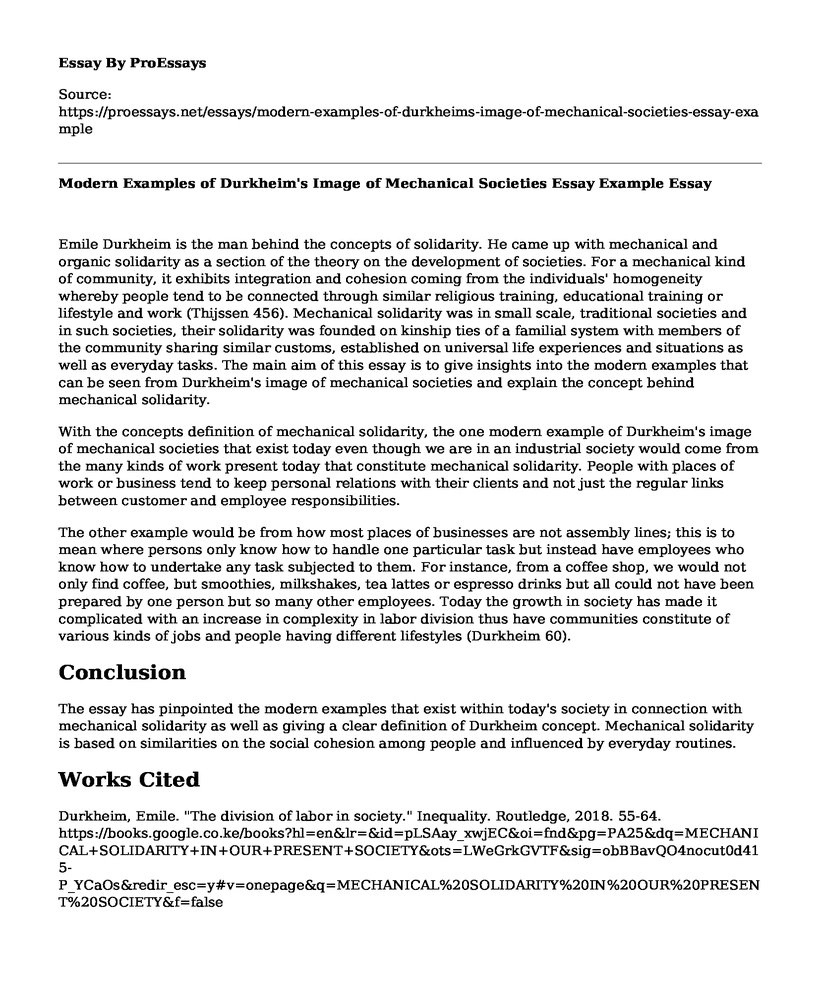Emile Durkheim is the man behind the concepts of solidarity. He came up with mechanical and organic solidarity as a section of the theory on the development of societies. For a mechanical kind of community, it exhibits integration and cohesion coming from the individuals' homogeneity whereby people tend to be connected through similar religious training, educational training or lifestyle and work (Thijssen 456). Mechanical solidarity was in small scale, traditional societies and in such societies, their solidarity was founded on kinship ties of a familial system with members of the community sharing similar customs, established on universal life experiences and situations as well as everyday tasks. The main aim of this essay is to give insights into the modern examples that can be seen from Durkheim's image of mechanical societies and explain the concept behind mechanical solidarity.
With the concepts definition of mechanical solidarity, the one modern example of Durkheim's image of mechanical societies that exist today even though we are in an industrial society would come from the many kinds of work present today that constitute mechanical solidarity. People with places of work or business tend to keep personal relations with their clients and not just the regular links between customer and employee responsibilities.
The other example would be from how most places of businesses are not assembly lines; this is to mean where persons only know how to handle one particular task but instead have employees who know how to undertake any task subjected to them. For instance, from a coffee shop, we would not only find coffee, but smoothies, milkshakes, tea lattes or espresso drinks but all could not have been prepared by one person but so many other employees. Today the growth in society has made it complicated with an increase in complexity in labor division thus have communities constitute of various kinds of jobs and people having different lifestyles (Durkheim 60).
Conclusion
The essay has pinpointed the modern examples that exist within today's society in connection with mechanical solidarity as well as giving a clear definition of Durkheim concept. Mechanical solidarity is based on similarities on the social cohesion among people and influenced by everyday routines.
Works Cited
Durkheim, Emile. "The division of labor in society." Inequality. Routledge, 2018. 55-64. https://books.google.co.ke/books?hl=en&lr=&id=pLSAay_xwjEC&oi=fnd&pg=PA25&dq=MECHANICAL+SOLIDARITY+IN+OUR+PRESENT+SOCIETY&ots=LWeGrkGVTF&sig=obBBavQO4nocut0d415-P_YCaOs&redir_esc=y#v=onepage&q=MECHANICAL%20SOLIDARITY%20IN%20OUR%20PRESENT%20SOCIETY&f=false
Thijssen, Peter. "From mechanical to organic solidarity, and back: With Honneth beyond Durkheim." European Journal of Social Theory 15.4 (2012): 454-470. https://www.researchgate.net/publication/266087374_From_Mechanical_to_Organic_Solidarity_and_Back_With_Honneth_Beyond_Durkheim
Cite this page
Modern Examples of Durkheim's Image of Mechanical Societies Essay Example. (2022, Dec 05). Retrieved from https://proessays.net/essays/modern-examples-of-durkheims-image-of-mechanical-societies-essay-example
If you are the original author of this essay and no longer wish to have it published on the ProEssays website, please click below to request its removal:
- Big Bang Theory: Introduction to Communication - Essay Sample
- Essay Sample on Tribal Governance
- Paper Example on Bullying: A Growing Scourge in Society
- Heroic Acts of Courage: Defining a Hero - Essay Sample
- Essay Example on Minnesota Youth: Protect Yourself from Sexually Transmitted Diseases
- Essay Sample on Serving the Community: Managing the Istanbul Football Academy in Nairobi, Kenya
- Free Report on Comparing Murder & Salvation: A Community's Resilience







